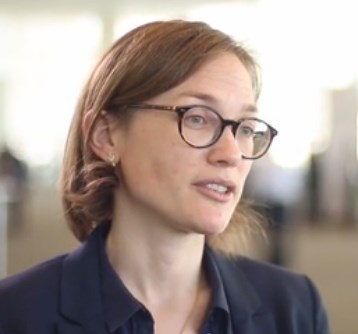User login
SAN FRANCISCO – Expanding the time between a liver fibrosis patient’s last meal and liver stiffness test may improve the accuracy of the test, according to a Danish study.
In patients referred for high liver stiffness, “we noticed that, when we called them in for a repeat liver stiffness measurement in a fasting state, that suddenly one patient with a high liver stiffness would have normal liver stiffness,” explained study researcher Dr. Maja Thiele of Odense (Denmark) University Hospital. “Potentially, this would have been a patient that we would have biopsied.”
In an interview at the annual meeting of the American Association for the Study of Liver Diseases, Dr. Thiele discussed the study’s findings and the clinical implications of food intake on subsequent liver stiffness test results, and she explained how long liver fibrosis patients should wait after a meal to undergo liver stiffness testing.
The video associated with this article is no longer available on this site. Please view all of our videos on the MDedge YouTube channel
SAN FRANCISCO – Expanding the time between a liver fibrosis patient’s last meal and liver stiffness test may improve the accuracy of the test, according to a Danish study.
In patients referred for high liver stiffness, “we noticed that, when we called them in for a repeat liver stiffness measurement in a fasting state, that suddenly one patient with a high liver stiffness would have normal liver stiffness,” explained study researcher Dr. Maja Thiele of Odense (Denmark) University Hospital. “Potentially, this would have been a patient that we would have biopsied.”
In an interview at the annual meeting of the American Association for the Study of Liver Diseases, Dr. Thiele discussed the study’s findings and the clinical implications of food intake on subsequent liver stiffness test results, and she explained how long liver fibrosis patients should wait after a meal to undergo liver stiffness testing.
The video associated with this article is no longer available on this site. Please view all of our videos on the MDedge YouTube channel
SAN FRANCISCO – Expanding the time between a liver fibrosis patient’s last meal and liver stiffness test may improve the accuracy of the test, according to a Danish study.
In patients referred for high liver stiffness, “we noticed that, when we called them in for a repeat liver stiffness measurement in a fasting state, that suddenly one patient with a high liver stiffness would have normal liver stiffness,” explained study researcher Dr. Maja Thiele of Odense (Denmark) University Hospital. “Potentially, this would have been a patient that we would have biopsied.”
In an interview at the annual meeting of the American Association for the Study of Liver Diseases, Dr. Thiele discussed the study’s findings and the clinical implications of food intake on subsequent liver stiffness test results, and she explained how long liver fibrosis patients should wait after a meal to undergo liver stiffness testing.
The video associated with this article is no longer available on this site. Please view all of our videos on the MDedge YouTube channel
AT THE LIVER MEETING 2015
